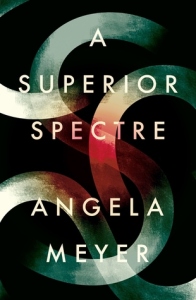 I’ve read Angela Meyer’s fiction before, so I knew she had a taste for the macabre, but her debut novel A Superior Spectre is very different to her flash fiction collection Captives. When I read Captives in preparation for our session at the Stonnington Literary Festival in 2015 I wrote this:
I’ve read Angela Meyer’s fiction before, so I knew she had a taste for the macabre, but her debut novel A Superior Spectre is very different to her flash fiction collection Captives. When I read Captives in preparation for our session at the Stonnington Literary Festival in 2015 I wrote this:
If you’ve ever met Angela, (as a well-known literary journalist and editor she’s out and about at all sorts of literary events) you will know that she has a vibrant personality. The room lights up when she’s around, she sparkles like classy champagne. So I am intrigued by her preoccupation with the macabre (and will be exploring this at the Stonnington LitFest). Where does this come from, this fascination with the noir, the creepy and the eerie? There are no vampires or ghouls in this collection, but there is horror of a different sort, signalled by the very first story….
A Superior Spectre is different to Captives in form because it’s a novel and a genre bending novel at that, but the underlying tone is also of horror. Not in that silly pulp fiction kind of way, but instead casting a dawning sense of a frightening future that might not be within our control. A future eerily like 1984 which has haunted us ever since George Orwell wrote it. The blurb talks of Angela’s interest in Scotland, gender, masculinity and the future of neuroscience, and how the historical richness of Outlander meets the powerful dystopian feminism of Margaret Atwood but appealing as that image of sexy men in kilts might sound, it’s a bit misleading.
Scotland, richly textured as it is, is only the backdrop for a man on the run. Like George Orwell writing 1984 on the remote island of Jura, Jeff is dying and he’s on the run from life. He has a story to tell, and it’s also a kind of warning, but there the similarities end. The time is 2024, and he’s left Australia to avoid pursuit by those who love him because he does not want them to know what a contemptible creature he is. And while his ambition is to inflict penance on himself through self-denial, his baser instincts triumph. He abuses the hi-tech toys he has brought with him and so the story he ends up telling is not the one that he thought he would share.
Jeff has a piece of experimental tech that allows him to enter the mind of someone in the past, and his hapless victim is Leonora from the 1860s. (There are no kilts, though there are corsets). In chapters that weave in and out of Jeff’s narrative, Leonora narrates the travails of life as an intelligent but dependent woman from the Highlands. Her ambitions are not unrealistic for the period: she just doesn’t want to marry because she likes working with animals, but she also wants to explore her own sexual identity. Her father remarries and sends her away from the countryside that she loves, to an Edinburgh that is bleak, and dirty and depressing. (I loved the epithet sooty to describe Edinburgh; as you can see on my travel blog, I was singularly unimpressed by the layers of accumulated grime over the buildings when I was there in 2005).
Even as Leonora has to stifle her rebellion against being readied for the marriage market, she meets people who spark her interest in an intellectual life. There are women breaking into university life and learning anatomy, and as she reads to her dozing aunt each night, she is absorbing new ideas from John Stuart Mill. At first Jeff in the 21st century merely observes Leonora’s life, but titillated by her emerging sexuality he breaks the injunction to use the device only three times with catastrophic consequences. Leonora begins to sense his dark presence in her own life. She sees inexplicable visions, she hears strange music that belongs nowhere in her world.
Well, the reader knows what happens to people who had hallucinations in the 19th century… it is signalled on the very first page:
I am not afraid of the dark. I have missed the complete darkness of the Highlands, and the quiet. But there is a drip somewhere. And the more I look into the darkness the more I notice that it is not absolute. There are blotches of light, of colour. Even when I close my eyes.
I yell, and then feel impolite, and then yell again. I brought myself here; should I not play by the rules? But then this is unnatural, to lock a person up.
Time moves slowly. Has it been minutes or an hour? Will I be here all night?
And the blotches of light resolve into a vision, of something she has stared at for a long time but never seen :

Boy with a Basket of Fruit (Caravggio,1593), source Wikipedia Commons
*chuckle* I’ll spare you the sound clips of the music Leonora hears.
With a tsunami of dementia cases about to overwhelm us, there is great interest in the brain and its memories amongst neuroscientists, so A Superior Spectre doesn’t seem so far-fetched to me.
Update 25/7/18 Right on cue, ABC News is reporting that telepathic communication ‘is just a matter of time’.
Author: Angela Meyer
Title: A Superior Spectre
Publisher: Ventura Press, 2018
ISBN: 9781925183917
Review copy courtesy of Ventura Press
Available from Fishpond: A Superior Spectre and also as an eBook, see the publisher’s website.


It seems these genre blendings are a brilliant way of introducing history along with futuristic possibilities. Technology is the catalyst for this longing for times past and forward into the unknown of possibilities that may very well be less than beneficent. Only the wonderful sphere of literature can do that to its optimum. This makes it an exciting era for writer but the tendency to film and tv series does create other concerns I guess. Although I remain optimistic that this amazing technology of literature will always be important.
LikeLike
By: Fay Kennedy on July 21, 2018
at 3:11 pm
Yes, I think I’m going to need to have a new category for these on the blog… just as soon as I can think of a name for it…
LikeLike
By: Lisa Hill on July 21, 2018
at 4:29 pm
I have read this, just holding my review back. It was very impressive and unsettling.
LikeLike
By: Theresa Smith Writes on July 22, 2018
at 10:50 am
Yes, unsettling, that’s just the right word…
LikeLiked by 1 person
By: Lisa Hill on July 22, 2018
at 5:28 pm
I enjoy speculative fiction but mostly get annoyed when it’s just an excuse to do historical fiction – not a fan of time travel! Still, this sounds interesting (Women were first admitted to Medicine in Edinburgh in 1869 so I hope the author gets that right).
LikeLike
By: wadholloway on July 23, 2018
at 9:21 pm
Although they’re completely different novels with completely different preoccupations, I think this one works in the way that Jane Rawson’s works…
LikeLike
By: Lisa Hill on July 24, 2018
at 7:37 am
High praise!
LikeLike
By: wadholloway on July 24, 2018
at 8:09 am
Yup!
And so I’m wondering, why hasn’t Angela got a gig at the MWF? Or for that matter, why are so few of the authors I’ve read getting a gig at the MWF and those that are at all the gigs and we’ve heard them all before? Why are the Indigenous writers I want to hear corralled off into the Schools Program?
LikeLike
By: Lisa Hill on July 24, 2018
at 9:48 am
I hope those are rhetorical questions! I can only note that I read today that Canberra Writers Festival is being top and tailed by those notable wordsmiths Barnaby Joyce and John Winston Howard.
LikeLike
By: wadholloway on July 25, 2018
at 9:43 pm
I look forward to reading your review when I get to this book myself!
LikeLike
By: whisperinggums on July 30, 2018
at 11:01 pm
[…] Rawson (From the Wreck) and Angela Meyer (A Superior Spectre) (to name just two) are already doing that, aren’t […]
LikeLike
By: Melodrome, by Marcelo Cohen, translated by Chris Andrews #BookReview | ANZ LitLovers LitBlog on November 10, 2018
at 6:53 pm
[…] A Superior Spectre by Angela Meyer, see my review A genre-bending work, this is a story of Scotland, time travel, feminism and […]
LikeLike
By: Readings’ List of 100 ‘great reads’ by Australian women (and some reviews) | ANZ LitLovers LitBlog on November 25, 2018
at 4:07 pm
[…] A Superior Spectre, by Angela Meyer […]
LikeLike
By: 2018 ANZLitLovers Australian and New Zealand Best Books of the Year | ANZ LitLovers LitBlog on December 15, 2018
at 5:38 pm
[…] Lisa (ANZLitLovers) also liked this book. […]
LikeLike
By: Angela Meyer, A superior spectre (#BookReview) | Whispering Gums on February 7, 2019
at 2:08 am
[…] publishers’ adult book of the year A Superior Spectre (Angela Meyer, Peter Bishop Books), see my review Blakwork (Alison Whittaker, Magabala) Deep Time Dreaming (Billy Griffiths, Black Inc.) Growing Up […]
LikeLike
By: 2019 Australian Book Industry Awards (ABIA) longlist | ANZ LitLovers LitBlog on March 7, 2019
at 11:57 am
[…] publishers’ adult book of the year A Superior Spectre (Angela Meyer, Peter Bishop Books), see my review Blakwork (Alison Whittaker, Magabala) Deep Time Dreaming (Billy Griffiths, Black Inc.) Growing Up […]
LikeLike
By: 2019 Australian Book Industry Awards (ABIA) winners | ANZ LitLovers LitBlog on May 2, 2019
at 9:42 pm
[…] A Superior Spectre by Angela Meyer (see my review) […]
LikeLike
By: 2019 Miles Franklin Longlist | ANZ LitLovers LitBlog on May 23, 2019
at 9:57 am
[…] A Superior Spectre by Angela Meyer, see my review […]
LikeLike
By: 2019 Readings Prize for New Australian Fiction shortlist | ANZ LitLovers LitBlog on August 20, 2019
at 2:49 pm
[…] A Superior Spectre by Angela Meyer, see my review […]
LikeLike
By: 2019 Readings Prize Winner | ANZ LitLovers LitBlog on October 22, 2019
at 2:16 pm